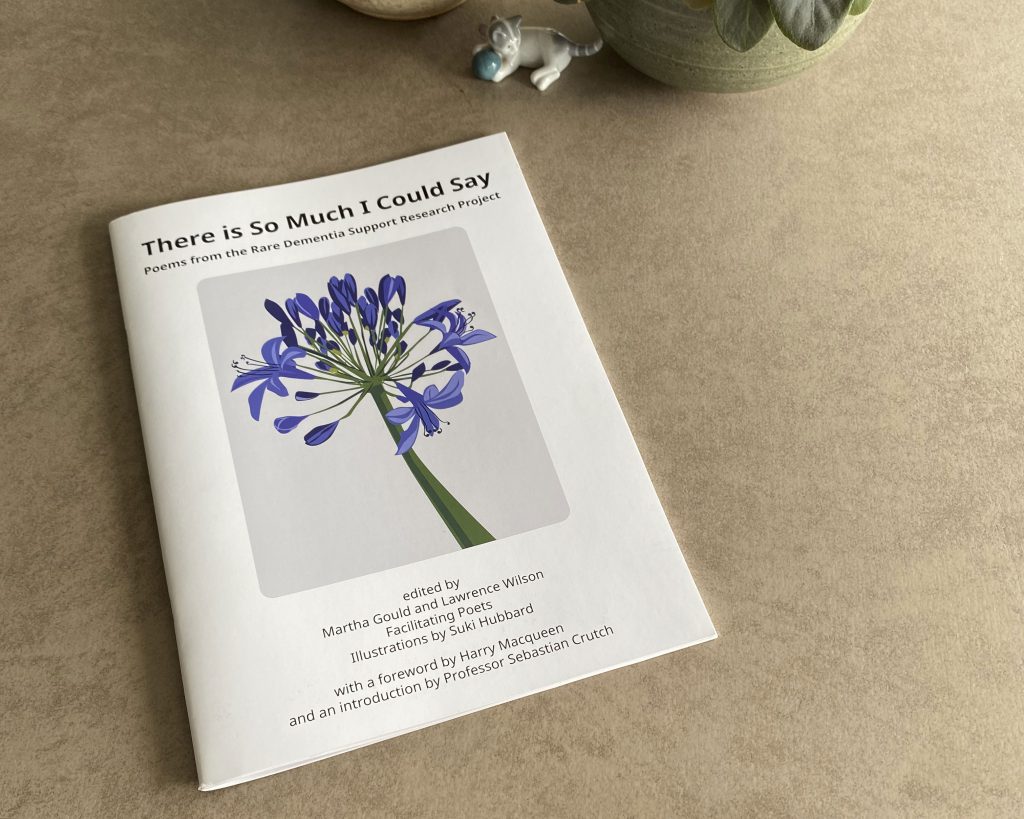
Journal Publications
There is a growing body of literature on peer support in dementia care reporting a variety of positive outcomes for people living with dementia and care partners. However, the lack of recognition of dementia diversity has meant that people living with a rare or young onset dementia have not had opportunities to participate in tailored peer support. We conducted a review of the literature to see what could be learned from existing research. We learned that peer support models for people with rare and young onset dementia were needed, including co-produced models, and that these required further development and evaluation.
Sullivan, M.P., Williams, V., Grillo, A., McKee-Jackson, R., Camic, P.M., Windle, G., Brotherhood, E., Stott, J. and Crutch, S.J. (2022) Peer support for people living with a rare or young onset dementia. Dementia. Online First. doi:10.1177/14713012221126368
In this article we describe the development, co-production, field testing, and evaluation plan for videoconferencing support groups tailored to people living with or caring for someone with familial or sporadic frontotemporal dementia or young onset Alzheimer’s disease, primary progressive aphasia, posterior cortical atrophy, or Lewy body dementia.
Waddington, C., Harding, E., Brotherhood, E.V., Davies Abbott, I., Barker, S., Camic, P.M., Ezeofor, V., Gardner, H., Grillo, A., Hardy, C., Hoare, Z., McKee-Jackson, R., Moore, K., O’Hara, T., Roberts, J., Rossi-Harries, S., Suarez Gonzalez, A., Sullivan, M.P., Tutor Edwards, R., Van Der Byl Williams, M., Walton, J., Willoughby, A., Windle, G., Winrow, E., Wood, O., Zimmermann, N., Crutch, S.J. and Stott, J. (2022) The development of videoconference-based support for people living with rare dementias and their carers: Protocol for a 3-phase support group evaluation. JMIR Research Protocols, 11 (6), e35376. doi: 10.2196/35376.
The use of poetry in research to develop an understanding of living with dementia is relatively uncommon. In this paper we describe how it was used in the Rare Dementia Support Impact Study. The description is provided to inform other researchers in the field of dementia on how they may use poetry as an accessible method for knowledge development. The collection of poetry There Is So Much I Could Say was an output emerged this work.
Camic, P., Harding, E., Sullivan, M.P., Grillo, A., McKee-Jackson, R., Wilson, L., Zimmermann, N., Brotherhood, E.V. and Crutch S.J. (2022) Developing poetry as a research methodology with rarer forms of dementia: Four research protocols. International Methods of Qualitative Methods, 21, 1-9. doi: 10.1177/16094069221081377.
This article is written for a journal that is accessed by dementia care practitioners. In this paper we review how peers may be used in the delivery of support for people living with rare or young onset dementia. We also draw attention to the need for a more in-depth understanding of how peers contribute alongside other forms of support.
Grillo, A., Sullivan, M.P., Williams, V. and McKee-Jackson, R. (2021) Tailored peer support in rare dementia care. Journal of Dementia Care, 29 (2), 26-28.
In this article for practitioners, we discuss the support needs and care preferences for people living with a rare or young onset dementia in a rural or remote area.
Windle, G., Roberts, J. and Sullivan, M.P. (2021) Rare dementia support in rural and remote areas. Journal of Dementia Care, 29 (1), 22-24.
How can younger people living with a rare dementia be better supported? The 5-year Rare Dementia Support Impact Study aimed to explore this question using a variety of methods. In this paper we set out and describe the different work packages to develop understanding of multi-component support for people affected by rare or young onset dementia.
Brotherhood, E., Stott, J., Windle, G., Barker, S., Camic, P., Caufield, M., Culley, S., Ezeofor, V., Harding, E., Hoare, Z., Mckee-Jackson, R., Roberts, J.; Sharp, R., Suarez-Gonzalez, A., Sullivan, M.P., Tudor-Edwards, R., Waddington, C., Walton, J., Winrow, E., and Crutch, S. (2019) Protocol for the Rare Dementia Support Impact Study: RDS Impact. International Journal of Geriatric Psychiatry, 35 (8). doi.org/10.1002/gps.5253.
We undertook interviews with 20 people living with posterior cortical atrophy and their family care partners. Three major themes emerged from the analysis of the interviews including: (1) the diagnostic journey: mostly an unsettling and convoluted process, owing to the early age of onset, rarity and atypical symptom profile of PCA. (2) Interactions with the physical environment: profound difficulties with functional and leisure activities were usually compensated for with adaptations maximising familiarity or simplicity. (3) Implications within the psychosocial environment: symptoms impacted individuals’ sense of independence and identity and required reallocations of roles and responsibilities.
Ongoing uncertainties and the progressive nature of PCA caused most dyads to take a ‘one day at a time’ approach to coping. Relatively well-preserved insight and memory were a benefit and burden, as individuals shared the illness experience with family members and also compared their current situation to pre-diagnosis. We concluded that the provision of tailored information about cortical visual problems and associated functional difficulties, time-sensitive environmental adaptations to help those with PCA to identify what and where things are and psychosocial interventions for the marital/family unit as a whole would be useful to improve both functional status and psychological well-being.
Harding, E., Sullivan, M.P., Woodbridge, R., Yong, K.X.X., McIntyre, A., Gilhooly, M.L., Gilhooly, K.J., and Crutch, S.J. (2018) ‘Because my brain isn’t as active as it should be, my eyes don’t always see’: a qualitative exploration of the stress process for those living with posterior cortical atrophy. BMJ Open; 8:e018663. doi:10.1136/ bmjopen-2017-01866.
There is a lack of knowledge to help us understand what resilience means when someone is living with dementia. This paper developed a theoretical model to inform healthcare practices and service development for people affected by dementia. It emphasizes the importance of both strengths-based and tailored approaches to support to help people achieve resilience. The authors call this ‘resilience practice’.
Windle, G., Roberts, J., MacLeod, C., Algar-Skaife, K., Sullivan, M. P., Brotherhood, E., Jones, C. H., & Stott, J. (2023). 'I have never bounced back': resilience and living with dementia. Aging & Mental Health, 1–13. Advance online publication. doi.org/10.1080/13607863.2023.2196248
Rural areas can create several obstacles more those living with dementia. There is typically less access to support or there are certain costs associated with accessing these supports/traveling to them. This prevents a barrier for many people who are seeking aid. This paper reviews the personal experiences of those living with dementia and their carers in rural areas.
Roberts, J.R., Windle, G., Story, A., Brotherhood E., Camic, P.M., Crutch, S.J., Stott, J., Sullivan, M.P. and Grillo, A. (2023) Dementia in rural settings: A scoping review exploring the personal experiences of people with dementia and their carers. Ageing & Society, 1-30. Advance online publication. doi:10.1017/S0144686X2300003X.

